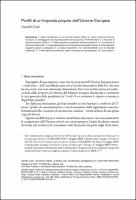Chapter Profili di un’imposta propria dell’Unione Europea
| dc.contributor.author | CANÈ, DANIELE | |
| dc.date.accessioned | 2022-12-22T16:04:54Z | |
| dc.date.available | 2022-12-22T16:04:54Z | |
| dc.date.issued | 2022 | |
| dc.identifier | ONIX_20221222_9788855185912_10 | |
| dc.identifier.issn | 2704-5919 | |
| dc.identifier.uri | https://library.oapen.org/handle/20.500.12657/60348 | |
| dc.language | Italian | |
| dc.relation.ispartofseries | Studi e saggi | |
| dc.subject.classification | thema EDItEUR::J Society and Social Sciences::JP Politics and government | en_US |
| dc.subject.other | Own taxes | |
| dc.subject.other | consent to taxation | |
| dc.subject.other | unanimity | |
| dc.subject.other | visibility of European policies | |
| dc.title | Chapter Profili di un’imposta propria dell’Unione Europea | |
| dc.type | chapter | |
| oapen.abstract.otherlanguage | The project of a tax as an own resource of the European Union stems from dissatisfaction with the financial set-up of the EU, which has never had true financial autonomy. It also draws new and unexpected inspiration from the proposals for reforming the European budget, aimed at containing the crisis generated by the Covid-19 pandemic and supporting the economic recovery of the member states. In this context, an own tax would allow the Union greater financial autonomy, new own resources to support post-pandemic economic recovery, and greater visibility to European citizens. The essay outlines the possible legal basis and the essential features of a European corporate income tax, while highlighting the implementation perplexities related to the unanimity mechanism for its approval. | |
| oapen.identifier.doi | 10.36253/978-88-5518-591-2.10 | |
| oapen.relation.isPublishedBy | bf65d21a-78e5-4ba2-983a-dbfa90962870 | |
| oapen.relation.isbn | 9788855185912 | |
| oapen.series.number | 237 | |
| oapen.pages | 24 | |
| oapen.place.publication | Florence |

